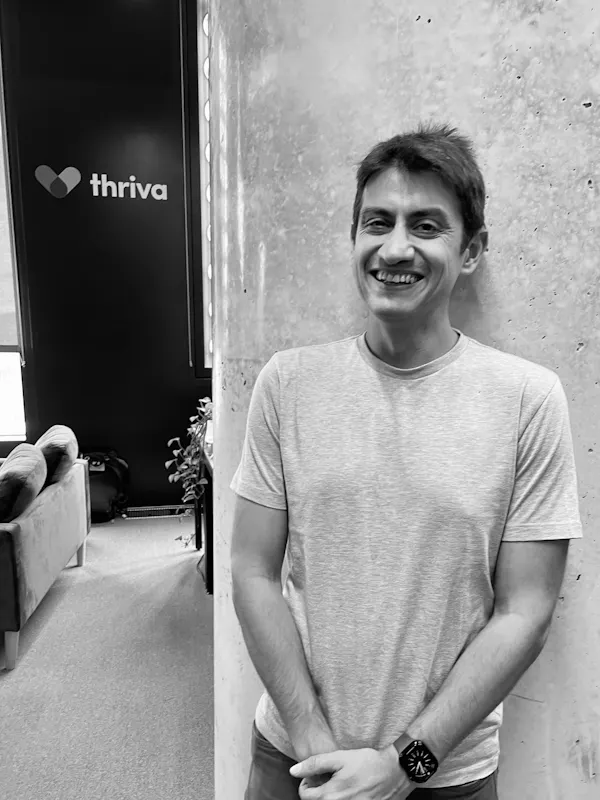My year-long health journey: A GP’s perspective on practising what I preach
What's covered?


At Thriva, we believe the best health journeys are grounded in curiosity, self-awareness, and small, sustainable steps. That’s why we’re proud to share this deeply personal and powerful story from one of our own doctors - Lucas. It’s not just a case study - it’s an honest account of what happens when health data inspires action. In this article, you’ll hear from a doctor who decided to practise what he preaches. The result? A shift not just in biomarkers, but in mindset - and in his ability to support others more meaningfully. We hope his experience inspires you to tune into your own data, listen to what it’s telling you, and take that next small step.
Starting Point: Knowing Isn’t the Same as Doing
Over the past year, I’ve undergone a personal health transformation that’s changed how I feel, how I live, and how I practise medicine. I’m a GP who qualified as a doctor in 2012. I’ve spent most of my working life in traditional NHS settings, with recent experience in private care, lifestyle medicine, and obesity medicine. I currently work with the Thriva clinical team.
Like many doctors, I’ve often found myself encouraging patients to exercise more or eat better, usually tacked on at the end of a rushed 10–15 minute consultation. But, if I’m honest, I wasn’t following my own advice.
Over time, my waistline expanded, my physical activity dwindled, and I constantly felt overwhelmed. I was snacking more than I’d like to admit, rarely exercised, and found myself increasingly demoralised by how far I’d drifted from the healthy habits I advocated. Like many people, I hadn’t made one dramatic decision that led me there; it was the result of small, cumulative lifestyle choices that slowly added up.
These creeping changes are easy to miss until they become impossible to ignore. With a strong family history of type 2 diabetes and stroke, I knew that my lifestyle was putting me at risk, but it still didn’t feel like something urgent enough to act on - even though my BMI was over 30, my waist circumference was raised, and my wearable data indicated poor physical fitness. That changed when I decided to try at-home blood testing.
A Blood Test That Made Things Real
I was curious about what a blood test might reveal. I didn’t have symptoms, wasn’t due for a routine check, and probably wouldn’t have seen my GP about it. But the availability of at-home blood testing removed the usual friction. Even better, a new sample collection option meant a less painful at-home device, which didn’t require me to prick my finger. As a doctor with a strong dislike of needles - at least when they’re coming at me - this was a welcome alternative.
(It’s not lost on me that being needle-phobic as a doctor is a bit of an occupational contradiction.)
The results, though not surprising, were still sobering. My lipid profile (a group of tests looking at fats in the blood) was unfavourable, with a high apolipoprotein B (ApoB) - a protein found on cholesterol particles that drive plaque formation in arteries - high LDL (low-density lipoprotein) cholesterol, and an abnormal triglyceride/HDL ratio (a useful proxy for insulin resistance).
My HbA1c, which gives an average of blood glucose over the past few months, was approaching the prediabetic range. My hsCRP, a marker of inflammation, was suboptimal. My ALT, a liver enzyme, was raised. While there are many causes of abnormal ALT levels, given my cholesterol and BMI, I suspected that the elevated ALT was likely due to metabolic dysfunction-associated steatotic liver disease (MASLD) - a newer term for what was previously known as NAFLD, or fatty liver. My HbA1c and triglyceride/HDL ratio suggested early stages of insulin resistance.
Altogether, the blood test painted a clear picture: I was on the road to metabolic syndrome and its associated diseases, and I needed to intervene.
Bridging the Gap Between Knowing and Acting
These weren’t abstract risks. I see patients all the time living with the consequences of these conditions. However, seeing the results in my own blood gave me a much-needed jolt. Like many people, I’d assumed I was “not that bad" - but I realised how easy it is to slide into trouble, especially in a world that makes unhealthy living so convenient. We sit too much, eat ultra-processed food, juggle stress, and sleep poorly. We know what we’re supposed to do - move more, eat better - but knowing isn’t the same as doing.
Reflecting on my medical training, I don’t recall receiving much, if any, formal education on the role of lifestyle in health. Topics like nutrition, exercise and sleep weren’t focused on. In hindsight, this seems like a major omission. These are foundational elements of health, and yet they felt largely absent from the curriculum. It's no wonder, then, that many of us - clinicians included - may underestimate their power.
A Realistic Overhaul
So, I decided to make a change - not a short-lived diet or a punishing regime, but a realistic, evidence-based overhaul. I began by immersing myself in some of the core tenets of lifestyle medicine: prioritising sleep, improving nutrition, increasing movement, managing stress and mental health, and reducing harmful substances. I did a lot of reading - some clinical, some popular science - and started applying the same principles I’d studied and sometimes taught.
As a doctor, I also considered the full range of evidence-based interventions, including pharmacological options. I initially trialled weight loss medication - not as a standalone solution, but as a supportive tool to help shift my physiology and appetite while I made broader behavioural changes. It helped reduce hunger and kick-started some weight loss, but I personally experienced side effects and ultimately chose to discontinue it. That period, though, gave me the opportunity to reassess what I was eating and build better habits.
The Habits That Made the Difference
I moved to calorie counting, which was eye-opening. I had no idea how quickly calories added up. I overhauled my nutrition, cutting back on ultra-processed snacks, replacing fruit juice with whole fruit, switching from milky to black coffee, and favouring fibre-rich meals, oily fish, legumes, and colourful vegetables. And, of course, reducing my reliance on takeaways. My wife’s vegetarian cooking helped me stay on track, and I even came to enjoy dark chocolate - an acquired taste at first, now a firm favourite.
On the movement side, I began the couch-to-5k programme, set a daily goal of 10,000 steps (my dog didn’t complain), and added basic strength training and morning bodyweight routines. I recruited friends for weekly gym sessions and even the occasional press-up challenge, which added some fun and accountability. I also took steps (no pun intended) to support my mental wellbeing. I read about Stoicism, incorporated breathing exercises, and tried to better manage my stress and sleep. I’m fortunate that sleep has never been a major issue for me, but I've worked on maintaining a consistent routine and used wearable technology to track my progress.
The Results: Numbers and Beyond
As the year progressed, I could feel the difference. I’d lost 20 kilograms, my clothes were looser, my resting heart rate had improved, and I felt fitter, sharper, and more positive. My wearable data confirmed what I suspected: I was getting fitter. But the real affirmation came when I repeated my at-home blood test.
The changes were striking. My HbA1c had decreased substantially. My LDL cholesterol dropped from 3.5 to 2.2 mmol/L, my apolipoprotein B level and ALT normalised, and my hsCRP moved into an optimal range. My triglyceride-to-HDL ratio had also improved dramatically, indicating a reduction in insulin resistance.
Together, these improvements pointed to something far more meaningful than better numbers - they signalled a shift toward long-term health. I’d moved away from the early warning signs of conditions like type 2 diabetes, heart disease, and fatty liver. In simple terms, I’d reduced my risk of developing the kinds of chronic illnesses I see in my patients every day. And crucially, I’d done it in a way that felt achievable and sustainable.






A New Kind of Motivation
What’s most satisfying is not just that I feel better, but that many of these changes feel sustainable. They don’t feel like a chore. And importantly, this experience has made me a better clinician. I now bring lifestyle conversations into consultations earlier and more meaningfully. I have a deeper understanding of the barriers people face, and a renewed respect for the power of early, upstream action.
We so often treat the downstream effects of lifestyle-influenced illness - diabetes, cardiovascular disease, fatty liver - but many of these conditions build silently over time, and we miss the window to intervene before disease sets in.
This hasn’t been a story of overnight success or rigid perfection. Some habits stuck, others didn’t. But enough did. What started with a simple blood test - one I wouldn’t have done without the ease of an at-home option - became the trigger for real change. And it wasn’t just the data itself, but what it represented.
There’s something powerful about knowing you’ll be checking again. It created a sense of accountability and motivation, often described as the Hawthorne effect - where simply being observed, or observing yourself, can drive positive change. In this case, knowing I’d be repeating the test gave me the momentum to stay consistent. For me, the right data, at the right time, helped change my trajectory.
I hope my experience encourages others - both doctors and patients - to take a small step toward better health. You never know where it might lead.
Resources
As part of my personal and professional development, I explored a range of resources that helped shape my thinking. The following books were ones I personally found interesting and informative. I have no affiliation with any of the authors or publishers, and this list is not intended as a recommendation or endorsement - simply a reflection of what I found valuable on my own journey: Just One Thing by Dr Michael Mosley, Outlive by Dr Peter Attia, Why We Die by Venki Ramakrishnan, Ultra-Processed People by Dr Chris van Tulleken, Why We Sleep by Matthew Walker, Meditations for Mortals by Oliver Burkeman and The Daily Stoic by Ryan Holiday.
I also undertook formal continuing professional development, including the Strategic Centre for Obesity Professional Education (SCOPE) certification and additional courses in lifestyle medicine.
Disclosure
I'm a GP, registered with the GMC, with a special interest in lifestyle medicine and a SCOPE certification. I work with Thriva’s clinical team, have equity in the company, and get my at-home blood tests for free as part of my role. I also still work part-time in the NHS.
This article is based on my own experience — it’s not medical advice. I’ve mentioned tools and tests that helped me personally, but they won’t be right for everyone. If you’re experiencing symptoms or have concerns about your health, please speak to a healthcare professional who can offer support tailored to your situation.